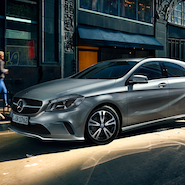- About
- Subscribe Now
- New York,
October 19, 2015

German automakers Mercedes-Benz, BMW and Audi are among the leaders in strategy and execution in autonomous cars, with Tesla and Jaguar a bit further behind, according to a new report by Navigant Research.
Although fully self-driving cars are still at least a decade away, pieces of the technology are already being implemented into vehicles today, meaning that the battle to be first is already waging. Because of the safety and ease of such a vehicle, the first brand to release an effective, fully autonomous car could capture a sizable segment of the market.
"Autonomous driving has been a long-term goal for the automotive industry for decades," said David Alexander, senior research analyst at Navigant Marketing. "Yet, only recently have self-driving vehicles started to become a realistic objective that can be achieved in practice."
“Navigant Research Leaderboard Report: Autonomous Vehicle OEMs” looks at the strategy and execution of 18 global vehicle manufacturers playing a role in the autonomous vehicle market. The success of each brand is gauged according to 12 criteria: vision, go-to-market strategy, partnerships, production strategy, technology, geographic reach, sales, marketing and distribution, product capability, product quality and reliability, product portfolio, pricing and company commitment, with brands then being scored on strategy and on execution on a 1-100 and categorized as a “follower,” “challenger,” “contender” or “leader” based on performance.
Drive my car
Brands that scored above 75 in both execution and strategy were termed “leaders.” Daimler, which owns Mercedes-Benz, was the highest scorer in each category, with General Motors, Audi and BMW rounding out the group.
Jaguar XF
Ford, Volvo, Honda and Toyota, which owns Lexus, just missed being leaders and are instead the highest ranked “contenders” in both categories, with Tesla and Jaguar Land Rover noticeably behind but also comfortably ahead of “challengers.”
In theory, autonomous cars have the opportunity to make driving safer and more energy efficient, but the reliability issue of the technology is still a major obstacle, even though many vehicles on the market or due on it soon are able to park themselves or stay in a lane while on cruise control. Currently, cars are expected to be able to follow simple navigation systems by 2020, with driverless cars loosely targeted for 2025.
BMW 7 series
Although Tesla is not ranked among the leaders in the study, the U.S. automaker last week released its Autopilot software, which can drive on the freeway, change lanes and parallel park. The visibility of Tesla’s advance could be a start of the automaker’s move.
Overall, luxury brands scored very well, taking the top three spots; however, the technology is far enough away for a mass-market brand, particularly GM, to make a move and overtake the lead. With autonomous cars being seen as the future for many in the automotive sector, being there first means both getting a jump on a large market and also maintain status as “luxury.” By contrast, falling behind could hurt a brand’s reputation in the long-term as well as create missed opportunities in the books.
Mercedes-Benz vehicle
Nevertheless, there are some consumers for whom self-driving cars may not appeal. Brands like Maserati, Ferrari, Lamborghini, Aston Martin and Porsche appeal to consumers first and foremost for their style and speed. Tesla, similarly, appeals in part for its environmental advances, suggesting that appealing to a different market segment or otherwise differentiating oneself from competition could provide an alternative path for those falling behind in the race for driverless cars.
In contention
Those marked as “contenders” in autonomous car technology have nevertheless emerged as innovators in other technological aspects.
For example, British automaker Jaguar partnered with Wired magazine last week to reach a new market segment with its latest innovations.
The luxury carmaker unveiled the XF C-X75 supercar, featured in the upcoming James Bond film “Spectre,” while the Land Rover brand will unveil its new “Mind Sense,” “Air Bubble,” “Predictive Infotainment” and “Cargo Sense” technologies. By coupling a hyped vehicle that has wide interest among consumers with technological advances, Jaguar will be able to reach a larger audience when it details its innovations (see story).
Likewise, U.S. electric automaker Tesla is going the extra mile in the name of convenience for its consumers.
Evolved Vehicle Environments Inc. (EVE) has used the latest technology to launch EVE Connect for Tesla, connecting the car with the home for the safety and convenience of the driver. The technology gives Tesla a unique advantage that will appeal to everyone from younger tech-savvy consumers to parents (see story).
"The market for autonomous vehicles is very much in its infancy," Mr. Alexander said. "Truly driverless cars are expected by 2025, but this date will depend on legislative changes as well as steady improvements in technology."
Final Take
Forrest Cardamenis, editorial assistant on Luxury Daily, New York
Share your thoughts. Click here